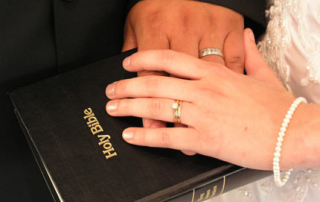Genesis 2:24, “Therefore a man shall leave his father and his mother and hold fast to his wife, and they shall become one flesh” (and quoted in Ephesians 5:31). Marriage and sexual intimacy are to occur only between a man and his wife. The words, “one flesh” refer to sexual intercourse. Sex outside of marriage is also forbidden, “Or do you not know that he who is joined to a prostitute becomes one body with her? For, as it is written, ‘The two will become one flesh.’…Flee from sexual immorality” 1 Corinthians 6:16,18.
Is sex ever condoned between two people of the same sex? No. In Genesis 19:5-7, 9 we read, “and they called to Lot and said to him, ‘where are the men who came to you tonight? Bring them out to us that we may have relations with them.’ But Lot went out to them at the doorway and shut the door behind him, and said, ‘Please, my brothers, do not act wickedly’…they pressed hard against Lot and came near to break the door…” In this account about Sodom, sexual relations between men are called “wicked.”
Leviticus 18:22, “You shall not lie with a man as with a woman. It is an abomination.” Those who argue against this would say this is part of the Old Testament Law and therefore, not applicable to Christians. Specifically, Acts 10:15, “What God has cleansed, you shall not call common” or unclean. However, the Acts scripture refers to the ceremonial (ritual) parts of the Law. The context of Leviticus 18 is the moral part of the Law.
While Christians are not held accountable to the ceremonial or judicial parts of the Levitical Law of Moses, the Law was made up of three primary parts:
- The Moral part of the Law (including the Ten Commandments) – they were valid then, now and will be applicable for all of eternity. Jesus upheld and enhanced the moral law. For example, even a married person lusting for another is considered adultery.
- The Ceremonial (or ritual) part of the Law – included such things like the physical sacrifices, dietary restrictions, circumcision and observation of feasts. Christians are not bound to the ceremonial aspects of the Law because of Jesus.
- The Judicial part of the Law applied the specifics of responsibility and liability in the context of the people at that time. For example, see Exodus 21:12-36. These are also no longer applicable.
Romans 1:26, 27 states, “For this cause, God gave them up to vile passions. For even their women exchanged the natural use for what is against nature. Likewise also the men, leaving the natural use of the woman, burned in their lust for one another, men with men committing what is shameful….” Romans 1:27, “and in the same way also the men abandoned the natural function of the woman and burned in their desire toward one another, men with men committing indecent acts…”, men with men sex is termed “indecent.” Consequently, engaging in homosexual sex is against God’s arrangements.
However, some people experience strong homosexual desires. Is sex permissible then? No. All of us – including heterosexuals – have unholy thoughts, actions and desires.
The Bible does not single out homosexuality as a sin above other sin. Perhaps we do not sense homosexual feelings, but we do have other impulses which are not in harmony with God’s plan for man. Feelings of jealousy, feelings of hatred, feelings of arrogance and pride are all labeled as detrimental to the person who harbors them and to those who receive the actions actuated by the emotion. Consequently, the best (but not necessarily the easiest) course is to restrict ourselves in thought, word and deed whenever we experience urges to act in ways in opposition to God’s arrangements.
All of us are sinners and Jesus died for all.
Being gay in and of itself is not a sin. It is quite probable that for some, it is not a choice, a whim, or a way to get attention, but may be genetically predisposed. The issue of sin comes in when it is acted upon. We all have a choice, regardless of sexual orientation. Sex outside of marriage is sinful, and because the Bible only acknowledges heterosexual marriage, the gay Christian person – just like the Christian straight single person – is to stay celibate in order to conform to scriptural guidelines. Sex outside of scripturally defined marriage is a form of idolatry and therefore not acceptable to God. Clearly the heterosexual community misuses and dishonors sexual relations, so this is not just a gay issue.
However, if a person confesses his homosexual behaviors, asks for forgiveness through Jesus, and stops practicing homosexuality, then that dear one’s sins are covered by the merit of Jesus’ sacrifice. He is then considered clean. “Don’t you know that the unrighteous will not inherit God’s kingdom? Do not be deceived: No sexually immoral people, idolaters, adulterers, or males who have sex with males, no thieves, greedy people, drunkards, verbally abusive people, or swindlers will inherit God’s kingdom. And some of you used to be like this. But you were washed, you were sanctified, you were justified in the name of the Lord Jesus Christ and by the spirit of our God” 1 Corinthians 6:9-11 (CSB).
Additional Resources:
For scriptural advice on our Christian response to such sins, we recommend the
Christian Questions Podcast Episode #879: “The Gay Marriage Law – How Do We Respond?”
Gay marriage, the Bible, Christianity and tolerance
CQ Rewind Show Notes
Christian Questions Podcast Episode #1241: Is It a Sin if I …? (Part II)
Discussing sex and sin-related questions using biblical principles
Preview Video CQ Rewind Show Notes











